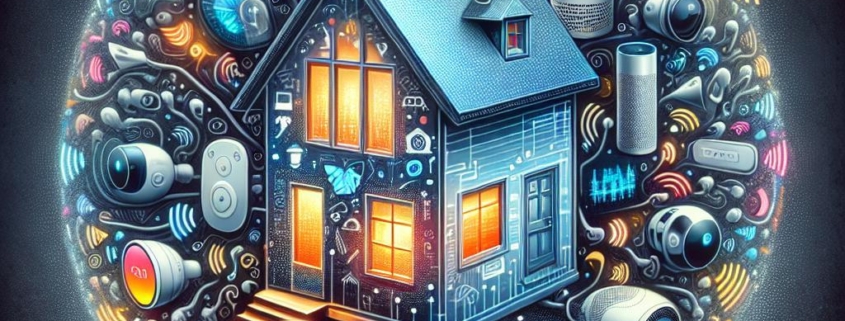In this age of smart home devices and voice assistants, concerns about privacy and data security have become more prevalent than ever. With the rise of products like Nest Thermostat, Amazon Echo, Alexa, Google Home, and Apple Siri, there is a growing awareness of the potential risks associated with using these devices in our homes. From listening in on private conversations to collecting personal data without consent, the issues surrounding privacy and smart home devices are complex and multifaceted. In this article, we will delve into the various privacy concerns associated with popular smart home devices and voice assistants and provide valuable insights on how to protect your privacy while enjoying the convenience these technologies offer.
Nest Thermostat Privacy
Nest Thermostat is a popular smart thermostat that allows users to control their home’s temperature remotely using a smartphone or voice commands. However, concerns have been raised about the privacy implications of using Nest Thermostat, particularly in terms of data collection and sharing. Users should be aware that Nest Thermostat collects data on their usage patterns, home occupancy, and energy consumption, which could potentially be shared with third parties without their knowledge or consent.
To protect your privacy when using Nest Thermostat, consider enabling privacy modes or settings that limit data collection and sharing. Additionally, regularly review and update your privacy settings to ensure that your data is not being shared with third parties without your consent.
Amazon Echo Privacy Concerns
Amazon Echo is an Alexa-powered smart speaker that can perform a wide range of tasks, from playing music to controlling smart home devices. However, there have been concerns raised about the privacy implications of using Amazon Echo, particularly in terms of always-on listening and data collection. Users should be aware that Amazon Echo is constantly listening for wake words, which means that it could potentially capture private conversations without your knowledge.
To protect your privacy when using Amazon Echo, consider disabling the microphone when not in use and reviewing your privacy settings to limit data collection and sharing. Additionally, be mindful of what you say around your Amazon Echo device to minimize the risk of your conversations being recorded and shared.
Alexa Privacy Listening
Alexa, the voice assistant powering Amazon Echo devices, has come under scrutiny for its listening capabilities and data collection practices. Users should be aware that Alexa is constantly listening for wake words and may inadvertently record private conversations or sensitive information. To protect your privacy when using Alexa, be cautious about what you say around your device and consider muting the microphone when not in use.
Echo Show 5 Privacy
Echo Show 5 is a smart display device with built-in Alexa capabilities that allows users to make video calls, watch videos, and control smart home devices. However, concerns have been raised about the privacy implications of using Echo Show 5, particularly in terms of its camera and microphone capabilities. Users should be aware that Echo Show 5 has the potential to capture video and audio data, which could potentially be shared with third parties without their knowledge or consent.
To protect your privacy when using Echo Show 5, consider covering the camera when not in use and disabling the microphone when not needed. Additionally, review your privacy settings to limit data collection and sharing.
Apple Siri Privacy
Apple Siri is a voice assistant that powers devices like the iPhone, iPad, and HomePod. While Apple has positioned itself as a leader in privacy and data security, concerns have been raised about the potential privacy risks associated with using Siri. Users should be aware that Siri collects data on their voice commands and interactions, which could potentially be stored and analyzed by Apple.
To protect your privacy when using Apple Siri, review your privacy settings and consider limiting the data that Siri can access. Additionally, be mindful of the information you share with Siri and avoid disclosing sensitive or personal data.
Amazon offers a dedicated portal for users to manage their privacy settings for Alexa-enabled devices. By visiting www.amazon.com/alexaprivacysettings, users can review and adjust their privacy preferences, including data collection, sharing, and access permissions. It is recommended that users regularly visit this portal to ensure that their privacy settings are up to date and in line with their preferences.
Google Home Data Privacy
Google Home is a line of smart speakers powered by Google Assistant that can perform a wide range of tasks, from answering questions to controlling smart home devices. However, concerns have been raised about the privacy implications of using Google Home, particularly in terms of data collection and sharing. Users should be aware that Google Home collects data on their interactions and commands, which could potentially be shared with third parties without their knowledge or consent.
To protect your privacy when using Google Home, review your privacy settings and consider limiting the data that Google Home can access. Additionally, be cautious about the information you share with Google Home and avoid disclosing sensitive or personal data.
Smart Home Devices and Privacy
Smart home devices, including thermostats, speakers, cameras, and locks, have become increasingly popular for their convenience and automation capabilities. However, the proliferation of these devices has raised concerns about privacy and data security. Users should be proactive in protecting their privacy when using smart home devices by reviewing and updating their privacy settings, limiting data collection and sharing, and being mindful of the information they share with these devices.
Echo Show Privacy Issues
Echo Show is a line of smart display devices from Amazon that feature Alexa capabilities and video calling functionalities. However, concerns have been raised about the privacy implications of using Echo Show, particularly in terms of its camera and microphone capabilities. Users should be aware that Echo Show has the potential to capture video and audio data, which could potentially be shared with third parties without their knowledge or consent.
To protect your privacy when using Echo Show, consider covering the camera when not in use, disabling the microphone when not needed, and reviewing your privacy settings to limit data collection and sharing.
Voice Assistant Privacy Concerns
Voice assistants like Alexa, Google Assistant, and Siri have revolutionized the way we interact with technology and control our smart devices. However, concerns have been raised about the privacy implications of using voice assistants, particularly in terms of data collection, listening capabilities, and potential security vulnerabilities. Users should be cautious about the information they share with voice assistants and take steps to protect their privacy, such as reviewing privacy settings, limiting data collection, and being mindful of their interactions.
Echo Privacy Concerns
Echo devices from Amazon, powered by Alexa, have become ubiquitous in many households, providing users with a convenient way to control smart home devices and access information. However, concerns have been raised about the privacy implications of using Echo devices, particularly in terms of always-on listening, data collection, and potential security vulnerabilities. Users should be vigilant about their privacy when using Echo devices and take steps to protect their personal data and conversations.
Google Home Privacy Concerns
Google Home devices, powered by Google Assistant, offer users a range of functionalities, from setting reminders to controlling smart home devices. However, concerns have been raised about the privacy implications of using Google Home, particularly in terms of data collection, sharing, and potential security vulnerabilities. Users should be aware of the privacy risks associated with using Google Home and take precautions to protect their personal data and interactions.
Alexa Privacy Concerns
Alexa, the voice assistant powering Amazon Echo devices, has become a household name for its convenience and versatility. However, concerns have been raised about the privacy implications of using Alexa, particularly in terms of always-on listening, data collection, and potential security vulnerabilities. Users should be proactive in protecting their privacy when using Alexa by reviewing and updating their privacy settings, limiting data collection, and being cautious about the information they share with the voice assistant.
Alexa Issues Privacy
Despite the many benefits of using Alexa-powered devices like Amazon Echo, there are several privacy issues that users should be aware of. These include always-on listening, data collection and sharing, potential security vulnerabilities, and the risk of private conversations being recorded without consent. To address these privacy issues, users should review their privacy settings, limit data collection, and be mindful of the information they share with Alexa.
Smart Devices and Privacy
Smart devices have revolutionized the way we live and interact with our homes, offering convenience, automation, and connectivity. However, the increasing prevalence of smart devices has raised concerns about privacy and data security. Users should take steps to protect their privacy when using smart devices by reviewing and updating their privacy settings, limiting data collection and sharing, and being mindful of the information they share with these devices.
Nest Lock Privacy Mode
Nest Lock is a smart lock device that allows users to control access to their homes remotely using a smartphone or voice commands. To protect your privacy when using Nest Lock, consider enabling privacy modes or settings that limit data collection and sharing. Additionally, regularly review and update your privacy settings to ensure that your data is not being shared with third parties without your consent.
Amazon Echo Show Privacy
Amazon Echo Show is a smart display device with built-in Alexa capabilities that offers users a range of functionalities, from video calls to controlling smart home devices. However, concerns have been raised about the privacy implications of using Echo Show, particularly in terms of its camera and microphone capabilities. To protect your privacy when using Echo Show, consider covering the camera when not in use, disabling the microphone when not needed, and reviewing your privacy settings to limit data collection and sharing.
Alexa Echo Devices and Your Privacy
Amazon Echo devices, powered by Alexa, have become an integral part of many smart homes, offering users a convenient way to control devices, access information, and perform tasks with voice commands. However, users should be mindful of their privacy when using Alexa-powered devices and take steps to protect their personal data and conversations. By reviewing privacy settings, limiting data collection, and being cautious about the information shared with Alexa, users can mitigate privacy risks associated with Echo devices.
Amazon provides a dedicated portal for users to manage their privacy settings for Alexa-enabled devices at http://www.amazon.com/alexaprivacysettings. By visiting this portal, users can review and adjust their privacy preferences, including data collection, sharing, and access permissions. Regularly visiting this portal is recommended to ensure that privacy settings are up to date and aligned with user preferences.
Alexa Amazon Privacy
Amazon Alexa has become a dominant force in the voice assistant market, offering users a range of functionalities and capabilities. However, concerns have been raised about the privacy implications of using Alexa, particularly in terms of data collection, listening capabilities, and potential security vulnerabilities. Users should be proactive in protecting their privacy when using Alexa by reviewing privacy settings, limiting data collection, and being cautious about the information shared with the voice assistant.
Amazon Alexa Privacy Issues
Amazon Alexa has faced scrutiny over privacy issues related to data collection, always-on listening, and potential security vulnerabilities. Users should be aware of the privacy risks associated with using Alexa and take steps to protect their personal data and interactions. By reviewing privacy settings, limiting data collection, and being cautious about the information shared with Alexa, users can mitigate privacy concerns and enjoy the benefits of voice assistant technology.
Alexa and Your Privacy
As a user of Amazon Alexa-powered devices, it is essential to be mindful of your privacy and take steps to protect your personal data and interactions. By reviewing and updating privacy settings, limiting data collection, and being cautious about the information shared with Alexa, users can safeguard their privacy while enjoying the convenience and functionalities offered by the voice assistant.
Amazon Echo Privacy
Amazon Echo devices have become essential components of many smart homes, offering users a range of functionalities and capabilities. However, concerns have been raised about the privacy implications of using Amazon Echo, particularly in terms of data collection, listening capabilities, and potential security vulnerabilities. Users should take proactive measures to protect their privacy when using Amazon Echo by reviewing privacy settings, limiting data collection, and being cautious about the information shared with the voice assistant.
Amazon Alexa Data Privacy
Amazon Alexa has come under scrutiny for its data privacy practices, including data collection, sharing, and potential security vulnerabilities. Users should be aware of the privacy risks associated with using Alexa and take steps to protect their personal data and interactions. By reviewing privacy settings, limiting data collection, and being cautious about the information shared with Alexa, users can mitigate data privacy concerns and enjoy the benefits of voice assistant technology.
Google Nest Audio Privacy
Google Nest Audio is a smart speaker that offers users a range of functionalities powered by Google Assistant. However, concerns have been raised about the privacy implications of using Google Nest Audio, particularly in terms of data collection, sharing, and potential security vulnerabilities. Users should be aware of the privacy risks associated with using Google Nest Audio and take steps to protect their personal data and interactions.
Google Assistant Privacy Concerns
Google Assistant, the voice assistant powering Google Home devices, has faced scrutiny over privacy concerns related to data collection, listening capabilities, and potential security vulnerabilities. Users should be cautious about the information shared with Google Assistant and take steps to protect their privacy by reviewing and updating privacy settings, limiting data collection, and being mindful of their interactions with the voice assistant.
Voice Assistants and Privacy
Voice assistants like Alexa, Google Assistant, and Siri have become indispensable tools for many users, offering convenience, automation, and connectivity. However, concerns have been raised about the privacy implications of using voice assistants, particularly in terms of data collection, listening capabilities, and potential security vulnerabilities. Users should be proactive in protecting their privacy when using voice assistants by reviewing privacy settings, limiting data collection, and being cautious about the information shared with these devices.
Echo Dot Privacy Issues
Echo Dot is a compact smart speaker from Amazon that offers users a range of functionalities powered by Alexa. However, concerns have been raised about the privacy implications of using Echo Dot, particularly in terms of data collection, listening capabilities, and potential security vulnerabilities. Users should be vigilant about their privacy when using Echo Dot and take steps to protect their personal data and conversations.
Amazon Echo Privacy Issues
Amazon Echo has faced scrutiny over privacy issues related to data collection, always-on listening, and potential security vulnerabilities. Users should be cautious about their privacy when using Amazon Echo and take proactive measures to protect their personal data and interactions. By reviewing privacy settings, limiting data collection, and being mindful of the information shared with Alexa, users can mitigate privacy concerns and enjoy the benefits of smart home technology.
Privacy Issues with Alexa and Google Home
Both Alexa and Google Home have faced privacy concerns related to data collection, listening capabilities, and potential security vulnerabilities. Users should be aware of the privacy risks associated with using these devices and take steps to protect their personal data and interactions. By reviewing privacy settings, limiting data collection, and being cautious about the information shared with voice assistants, users can safeguard their privacy while enjoying the functionalities offered by smart home devices.
Ecobee Privacy
Ecobee is a popular smart thermostat company that offers users the ability to control their home’s temperature remotely. However, concerns have been raised about the privacy implications of using Ecobee, particularly in terms of data collection and sharing. Users should review privacy settings and consider enabling privacy modes to limit data collection and sharing. Additionally, be cautious about the information shared with Ecobee to protect your privacy.
Alexa Privacy Mode
Alexa offers users the ability to enable privacy mode, which limits data collection and sharing to protect their privacy. By enabling privacy mode, users can restrict Alexa’s ability to listen and record conversations, providing a level of privacy and control over their data. Users should review privacy settings and consider enabling privacy mode to protect their personal data and interactions with Alexa.
Voice Assistant Privacy
Voice assistants have become integral parts




